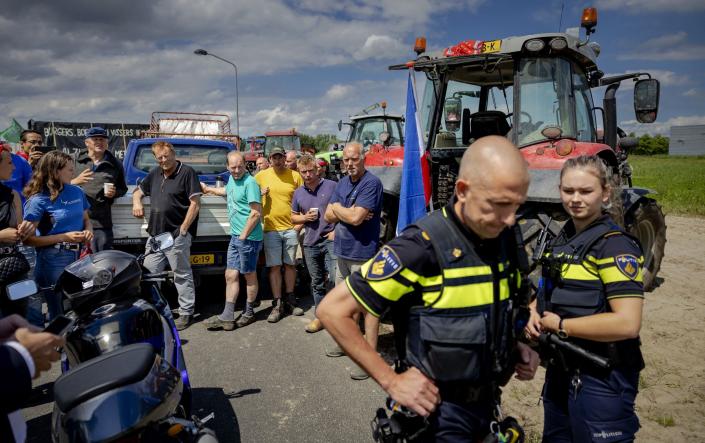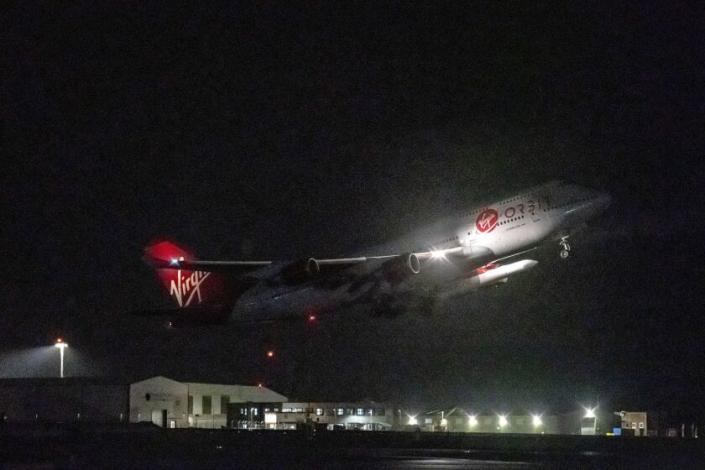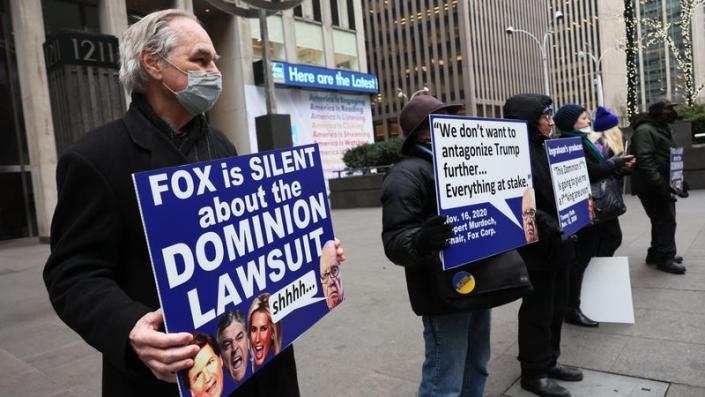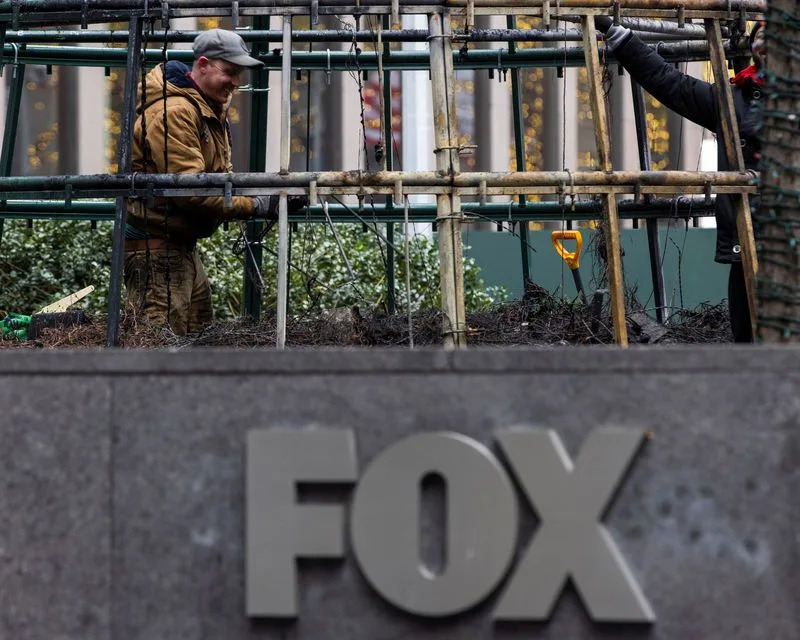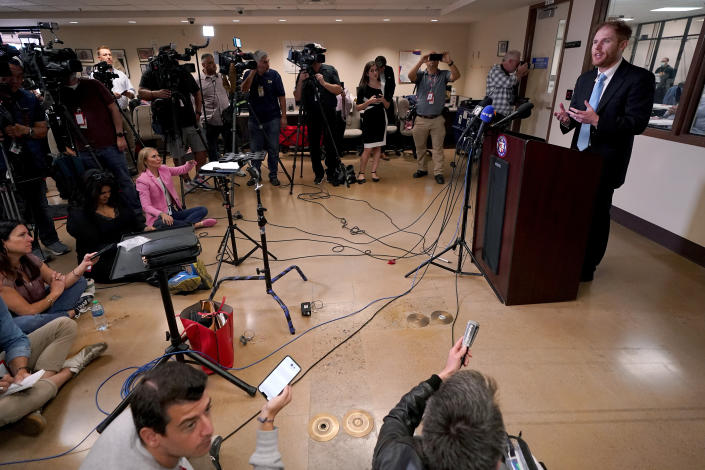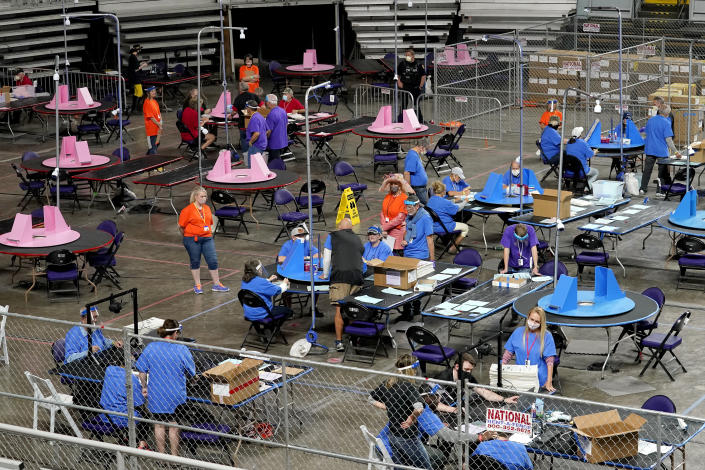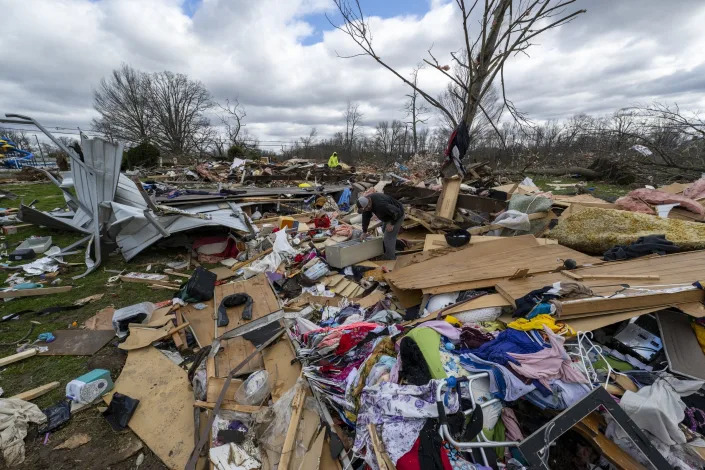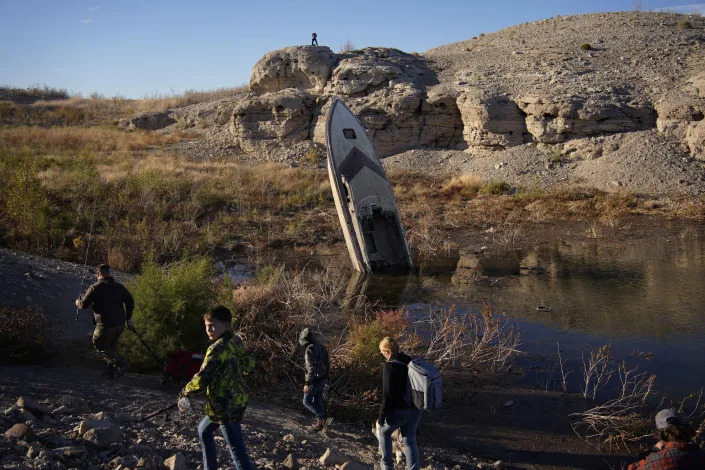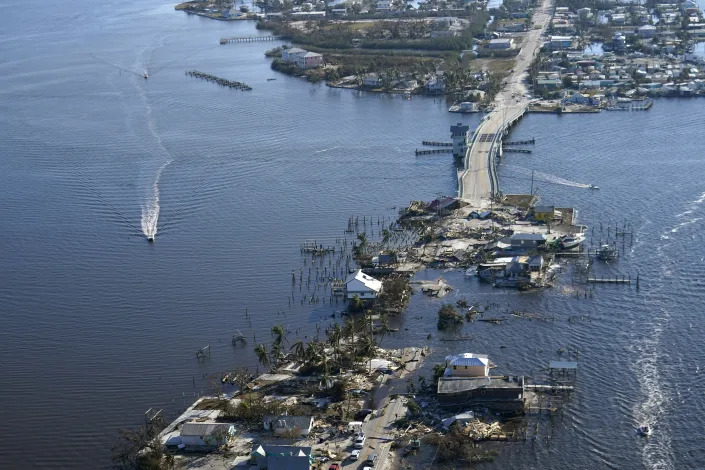Palestinian cities in Israel go on strike over killing of Palestinian doctor
The general strike is in response to Israeli forces killing Mohammed al-Osaibi at the gates of the Al-Aqsa Mosque complex on Friday
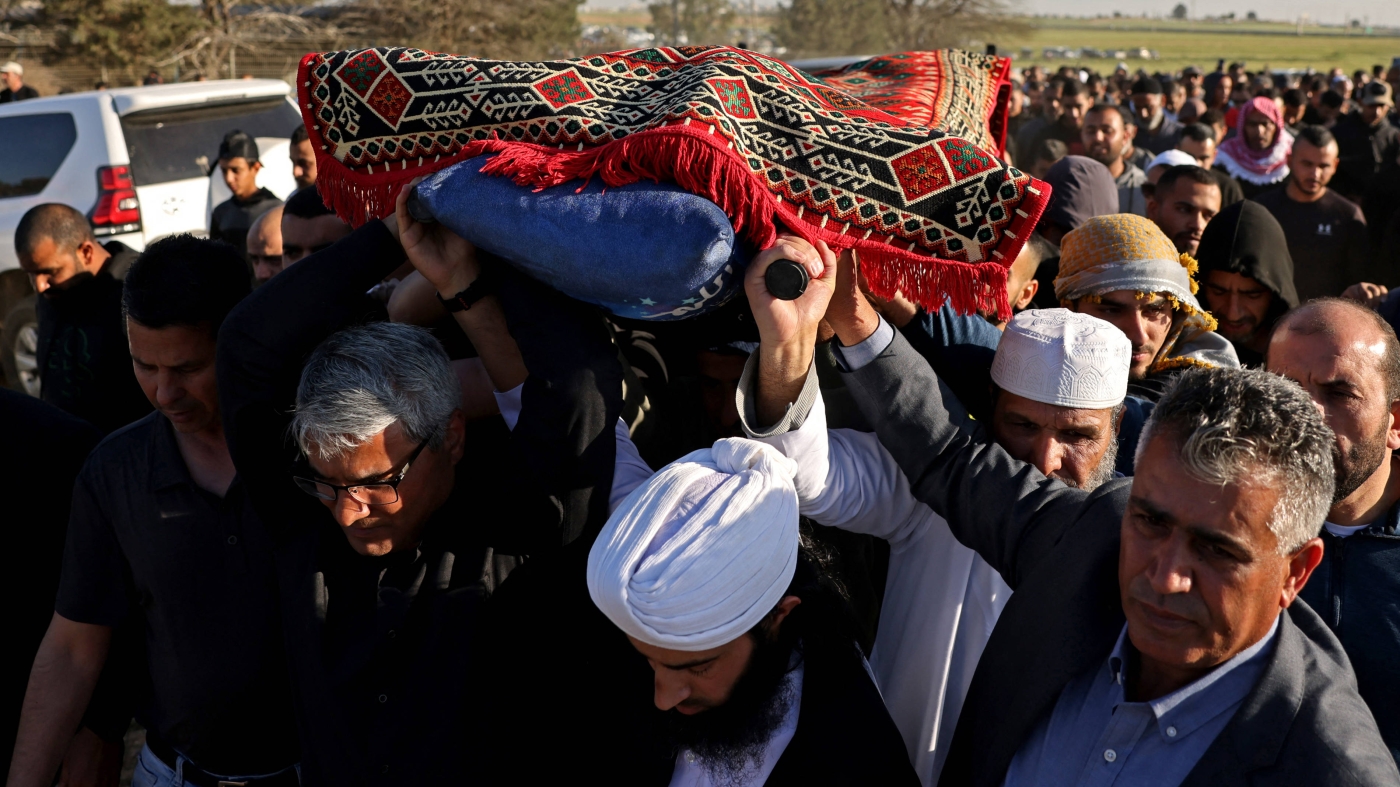
Mourners carry the body of Palestinian Mohammed al-Osaibi, during his funeral in the Bedouin village of Hura in southern Israel on 2 April 2023 (AFP)
Published date: 2 April 2023
Palestinian cities and towns across Israel on Sunday observed a one-day strike following a call by the High Follow-Up Committee for Arab Citizens of Israel in response to the killing of Mohammed al-Osaibi, a Palestinian doctor who was fatally shot by Israeli forces.
Eyewitnesses said police shot Osaibi 10 times at the Chain Gate (Bab al-Silsela), one of the gates to the Al-Aqsa Mosque complex in the Old City of Jerusalem, on Friday evening after he tried to prevent them from harassing a woman trying to re-enter the mosque.
Israeli police said in a statement that the man tried to grab a soldier's weapon and was subsequently shot and "neutralised". Osaibi was a 26-year-old resident of the bedouin town of Hura in the Naqab (Negev) region in southern Israel.
Osaibi's family has disputed the police account of his death and demanded to see CCTV footage, Israeli media reported. Osaibi had recently earned his medical degree in Romania and returned to his hometown a month ago, the family said.
The Israeli police, meanwhile, stood by their original version of events and issued another statement on Saturday afternoon saying that the site of the attack was not covered by surveillance cameras.
Stay informed with MEE's newsletters
Sign up to get the latest alerts, insights and analysis, starting with Turkey Unpacked
Following an emergency meeting on Saturday in Hura, the High Follow-Up Committee for Arab Citizens of Israel called for a strike that includes all municipalities, public educational facilities and shops in Palestinian cities and towns in Israel.
"There are attempts to [push forward] a fabricated Israeli scenario to distort the truth and hide the evidence, which points to the Ben Gvir police and condemns them for committing the heinous crime against Mohammed al-Osaibi," the committee said in a statement in reference to National Security Minisiter Itamar Ben Gvir.
'It will not go unnoticed'
Palestinians, who have called Osaibi's killing "an execution", responded to the strike in great numbers, closing their shops and holding marches and vigils, where pictures of the doctor were raised.
Writer and political analyst Saher Ghazzawi said scenes from the strike brought back memories of the comprehensive strike that took place in Palestinian towns and cities in Israel in the early days of the Al-Aqsa Intifada in October 2000.
"It isn't inconceivable to see things develop and take the same direction of escalation and the ignition of the Palestinian street. There's an atmosphere of tension being felt by Palestinian society following the murder of the young doctor," he told Middle East Eye.
Ghazzawi said that the tension comes in tandem with the racist practices and statements of the Israeli government and political parties "against everything that is Palestinian".
The vigils that took place in many Palestinian cities in Israel, at crossroads and town entrances, on Saturday, are expected to continue well into Sunday after Osaibi's funeral in his hometown, and are likely to turn into a mass demonstration.
"Palestinian public opinion completely rejects the occupation police's account that condemns the victim, so this crime will not go unnoticed," Ghazzawi said.
Osaibi is an only child, and was caring for his ailing father as he worked to get certified in Israel. As the whole town came to a standstill following the news of his death, Osaibi's family opened their home to mourners, as they waited for the Israeli authorities to release their son's body.
Ibrahim al-Osaibi said that the family rejects the police's claims that his cousin had tried to snatch the weapon of one of its forces. He added that Osaibi was unarmed and had tried to free the Palestinian woman being assaulted by the police.
"We consider it a crime, by all standards, for a young man to be shot just because he tried to defend a woman who was being subjected to abuse," said Ibrahim al-Osaibi.
'Field executions'
Israeli Prime Minister Bejamin Netanyahu has, meanwhile, praised the doctor's killing and said the police had "prevented an attack in the area".
The general strike is in response to Israeli forces killing Mohammed al-Osaibi at the gates of the Al-Aqsa Mosque complex on Friday

Mourners carry the body of Palestinian Mohammed al-Osaibi, during his funeral in the Bedouin village of Hura in southern Israel on 2 April 2023 (AFP)
By Fayha Shalash in
Ramallah, occupied Palestine
Ramallah, occupied Palestine
Published date: 2 April 2023
Palestinian cities and towns across Israel on Sunday observed a one-day strike following a call by the High Follow-Up Committee for Arab Citizens of Israel in response to the killing of Mohammed al-Osaibi, a Palestinian doctor who was fatally shot by Israeli forces.
Eyewitnesses said police shot Osaibi 10 times at the Chain Gate (Bab al-Silsela), one of the gates to the Al-Aqsa Mosque complex in the Old City of Jerusalem, on Friday evening after he tried to prevent them from harassing a woman trying to re-enter the mosque.
Israeli police said in a statement that the man tried to grab a soldier's weapon and was subsequently shot and "neutralised". Osaibi was a 26-year-old resident of the bedouin town of Hura in the Naqab (Negev) region in southern Israel.
Osaibi's family has disputed the police account of his death and demanded to see CCTV footage, Israeli media reported. Osaibi had recently earned his medical degree in Romania and returned to his hometown a month ago, the family said.
The Israeli police, meanwhile, stood by their original version of events and issued another statement on Saturday afternoon saying that the site of the attack was not covered by surveillance cameras.
Stay informed with MEE's newsletters
Sign up to get the latest alerts, insights and analysis, starting with Turkey Unpacked
Following an emergency meeting on Saturday in Hura, the High Follow-Up Committee for Arab Citizens of Israel called for a strike that includes all municipalities, public educational facilities and shops in Palestinian cities and towns in Israel.
"There are attempts to [push forward] a fabricated Israeli scenario to distort the truth and hide the evidence, which points to the Ben Gvir police and condemns them for committing the heinous crime against Mohammed al-Osaibi," the committee said in a statement in reference to National Security Minisiter Itamar Ben Gvir.
'It will not go unnoticed'
Palestinians, who have called Osaibi's killing "an execution", responded to the strike in great numbers, closing their shops and holding marches and vigils, where pictures of the doctor were raised.
Writer and political analyst Saher Ghazzawi said scenes from the strike brought back memories of the comprehensive strike that took place in Palestinian towns and cities in Israel in the early days of the Al-Aqsa Intifada in October 2000.
'Palestinian public opinion rejects the occupation police's account... this crime will not go unnoticed'
- Saher Ghazzawi, writer and analyst
"It isn't inconceivable to see things develop and take the same direction of escalation and the ignition of the Palestinian street. There's an atmosphere of tension being felt by Palestinian society following the murder of the young doctor," he told Middle East Eye.
Ghazzawi said that the tension comes in tandem with the racist practices and statements of the Israeli government and political parties "against everything that is Palestinian".
The vigils that took place in many Palestinian cities in Israel, at crossroads and town entrances, on Saturday, are expected to continue well into Sunday after Osaibi's funeral in his hometown, and are likely to turn into a mass demonstration.
"Palestinian public opinion completely rejects the occupation police's account that condemns the victim, so this crime will not go unnoticed," Ghazzawi said.
Osaibi is an only child, and was caring for his ailing father as he worked to get certified in Israel. As the whole town came to a standstill following the news of his death, Osaibi's family opened their home to mourners, as they waited for the Israeli authorities to release their son's body.
Ibrahim al-Osaibi said that the family rejects the police's claims that his cousin had tried to snatch the weapon of one of its forces. He added that Osaibi was unarmed and had tried to free the Palestinian woman being assaulted by the police.
"We consider it a crime, by all standards, for a young man to be shot just because he tried to defend a woman who was being subjected to abuse," said Ibrahim al-Osaibi.
'Field executions'
Israeli Prime Minister Bejamin Netanyahu has, meanwhile, praised the doctor's killing and said the police had "prevented an attack in the area".
Read More »
The committee, an umbrella organisation representing Israel's Palestinian citizens, called for a special investigation committee to look into Osaibi's killing.
It also encouraged a massive turnout to his funeral in protest against all "occupation policies, oppression and racial discrimination".
The Mizan Foundation for Human Rights described Osaibi's killing as "a heinous crime" and part of "a systematic policy based on field executions and the killing of Palestinians".
"The policy of easily pulling the trigger against Palestinians has become a rooted 'culture' in the psyche of the Israeli security services, and a systematic policy that feeds on an atmosphere of incitement [and] murder," Mizan said in a statement.
Since the beginning of the year, Israeli forces have killed at least 87 Palestinians, including fighters and civilians, in the deadliest start to a year since 2000, according to the Palestinian health ministry.
On Saturday, Israeli forces killed 23-year-old Palestinian Mohammed Baradyah after he allegedly conducted a car-ramming attack near the town of Beit Ummar, north of Hebron, wounding three Israelis.
The weekend's escalation threatens to end a relative lull during the Muslim holy month of Ramadan so far, a period that usually witnesses an increase in confrontations between Israeli forces and Palestinians, especially in East Jerusalem as Israel tightens restrictions against Palestinians in the area.
The committee, an umbrella organisation representing Israel's Palestinian citizens, called for a special investigation committee to look into Osaibi's killing.
It also encouraged a massive turnout to his funeral in protest against all "occupation policies, oppression and racial discrimination".
The Mizan Foundation for Human Rights described Osaibi's killing as "a heinous crime" and part of "a systematic policy based on field executions and the killing of Palestinians".
"The policy of easily pulling the trigger against Palestinians has become a rooted 'culture' in the psyche of the Israeli security services, and a systematic policy that feeds on an atmosphere of incitement [and] murder," Mizan said in a statement.
Since the beginning of the year, Israeli forces have killed at least 87 Palestinians, including fighters and civilians, in the deadliest start to a year since 2000, according to the Palestinian health ministry.
On Saturday, Israeli forces killed 23-year-old Palestinian Mohammed Baradyah after he allegedly conducted a car-ramming attack near the town of Beit Ummar, north of Hebron, wounding three Israelis.
The weekend's escalation threatens to end a relative lull during the Muslim holy month of Ramadan so far, a period that usually witnesses an increase in confrontations between Israeli forces and Palestinians, especially in East Jerusalem as Israel tightens restrictions against Palestinians in the area.
Hiba ASLAN
Sun, April 2, 2023

The family of an Arab Israeli medical student shot dead by police at Jerusalem's Al-Aqsa mosque compound rejected on Sunday claims by the force that he grabbed and fired an officer's gun.
Medical student Mohammed al-Asibi was killed late Friday, hours after worshippers marking the Muslim holy month of Ramadan held prayers at the sacred site.
Israeli police said the 26-year-old "managed to take the gun (from an officer) and fire two bullets" before being shot dead by officers.
The force said Sunday that Asibi's DNA was found "on the (loading) slide and handle of the pistol", providing "unambiguous" proof that officers "acted courageously".
As mourners gathered Sunday in Asibi's Bedouin village of Hura, in southern Israel, his family said he had travelled to Jerusalem only to pray.
"We reject the police's story, which is false and slanderous," said one of his sisters, who requested anonymity due to fear of retaliation.
She described her brother as a "polite and well-mannered person who loved helping others and (had) a peaceful personality".
Raam, the Israeli parliament's Islamist party, noted in a Facebook post claims from "witnesses" who said Asibi had gone to the aid of a woman who was in a scuffle with police.
Asibi was reaching the end of his medical studies in Romania and had just renewed his residency visa ahead of his final exam, his family said.
Relatives told AFP that police raided their home after the shooting, interrogated his parents and seized Asibi's personal belongings.
The head of Hura's municipal council, Habis al-Atawneh, said his community "all believe that the young man was executed."
- No footage of shooting -
Doubts have been raised over the shooting in Israeli-annexed east Jerusalem, particularly because police said there was no footage of the shooting at the heavily-surveilled compound.
A police spokesman told AFP on Sunday that the incident happened in a surveillance camera blind spot, while the officer whose weapon was grabbed by Asibi did not have time to turn on his body camera.
Police earlier rejected the notion of a woman being involved, saying Asibi was at the mosque compound alone and therefore "aroused suspicion".
"He was questioned by the police and asked to leave the Temple Mount compound since it was after closing hours, and then carried out the aforementioned attack," their statement added, using the Jewish name for the site.
The compound in Jerusalem's Old City is the most sacred site for Jews and the third-holiest place for Muslims.
Prime Minister Benjamin Netanyahu on Sunday gave "full backing to the Israel police for thwarting the terrorist on the Temple Mount."
Waleed Alhwashla, from Raam, was among Arab lawmakers attending Asibi's funeral on Sunday.
He said parliamentarians were in touch with foreign diplomats to "internationalise the issue of the Arabs of the Negev (in southern Israel) and the issue of the martyr Mohammed."
Asibi's Bedouin community is part of Israel's Arab minority, which makes up around 20 percent of the population and many of whom identify as Palestinian.
Businesses in the village shut Sunday as residents went on strike to protest Asibi's killing, an action also observed in other Arab-Israeli communities, according to local media.
Asibi is one of more than a hundred people killed so far this year in the Israeli-Palestinian conflict.
His death followed a relative lull in the violence since Ramadan began on March 23.
In addition to him, the conflict has claimed the lives of 88 Palestinians, including militants and civilians, since the start of the year.
Separately, fourteen Israelis, including members of the security forces and civilians, and one Ukrainian have been killed over the same period, according to an AFP tally based on official sources from both sides.
ha/rsc/jjm/it
Israeli police fatally shoot man at Jerusalem's holiest site
IOF ISRAEL OCCUPATION FORCE
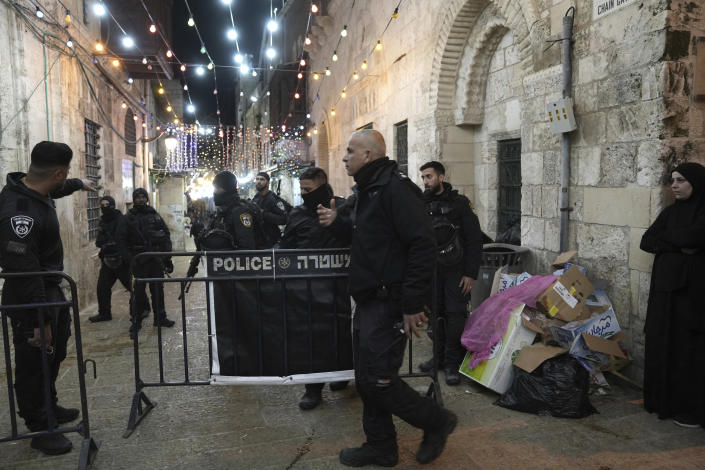
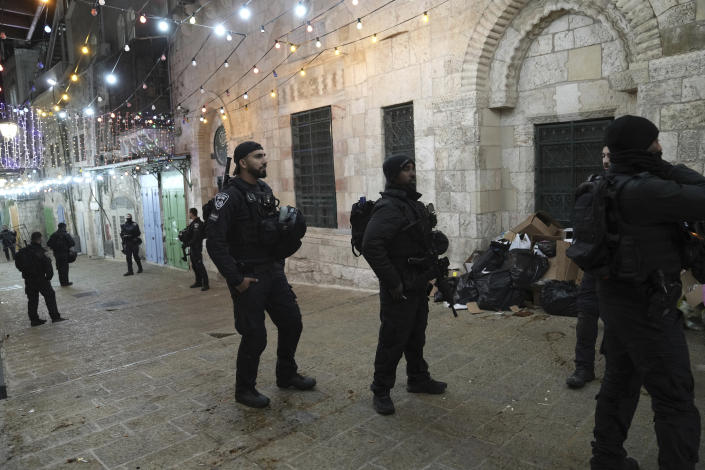
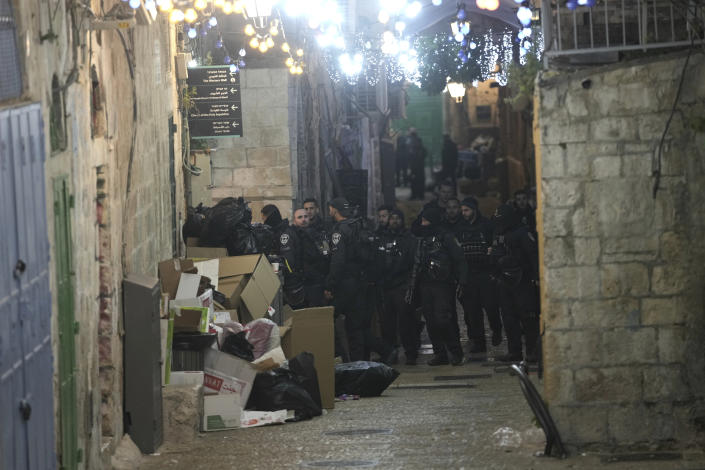







Israeli police deploy in the Old City of Jerusalem after shots were fired in the Al-Aqsa Mosque compound during the Muslim holy month of Ramadan, Saturday, April 1, 2023. (AP Photo/ Mahmoud Illean)
ASSOCIATED PRESS
ISABEL DEBRE
Fri, March 31, 2023
JERUSALEM (AP) — Israeli police shot and killed a man who they alleged tried to snatch an officer’s gun at an entrance to a Jerusalem holy site early Saturday, raising fears of further violence during a time of heightened tensions at the flashpoint compound.
Later Saturday, the Israeli military said a Palestinian driver rammed his vehicle into a group of Israelis in the occupied West Bank. Israeli medics said three people were wounded, two seriously, and the alleged attacker was shot dead.
In Jerusalem's police shooting, Palestinian worshippers at the entrance to the site on Saturday morning had a different account, saying that police shot the man at least 10 times after he tried to prevent them from harassing a woman who was on her way to the holy compound, home to Al-Aqsa Mosque in the heart of Jerusalem’s Old City — the third holiest shrine in Islam. The compound, revered by Jews as the Temple Mount, is also the most sacred site in Judaism.
The police said the slain man was 26-year-old Mohammed Alasibi from Hura, a Bedouin Arab village in southern Israel. The village council called for a thorough investigation of his killing and a general strike Saturday in protest.
Hours after the incident, the muddy stone alleyway leading to Al-Aqsa Mosque was still stained with blood. Alasibi's family said he was a physician who had recently passed his exams and earned his M.D. in Romania. He returned to his hometown a month ago, his cousin said, and was caring for his sick father as he worked to get certified in Israel.
“He is a polite, kind man from a family of doctors who was going to Al-Aqsa for spiritual reasons,” his cousin Fahad Alasibi said. “If you want us to believe that he tried to attack police, then show us the security footage.”
A police spokesperson pushed back on Palestinian accounts, insisting there was no woman walking to the compound at midnight because the complex was closed to visitors under an agreement with an Islamic trust called the Waqf controlled by Jordan.
Nonetheless, a few dozen people have been trying to sleep at the mosque overnight during the Islamic holy month of Ramadan, prompting Israeli police to intervene and try to evict the worshippers.
The police spokesperson said Alasibi first aroused suspicion walking toward the shuttered compound. After being stopped for questioning, the spokesperson said Alasibi jumped on one of the officers and grabbed his gun, managing to fire two bullets toward policemen as the officer struggled to restrain him. Police described the incident as an attempted terrorist attack and said they shot and killed him in self-defense. No officers were injured. The spokesperson said there was no camera on the inner wall of the compound that could have captured the incident.
Palestinian worshippers at the compound Saturday disagreed. Noureddine, a 17-year-old who lived in the neighborhood and declined to give his last name for fear of reprisals, said he saw Alasibi confront police who had stopped a female worshipper on her way to Al-Aqsa Mosque. Alasibi’s relationship to the woman was not clear. He said some kind of disagreement broke out between Alasibi and the officers before he heard a dozen shots ring out.
“Nothing could justify that many shots,” he said, pointing to chaotic footage he filmed that showed Palestinian vendors and worshippers screaming at the sound of bullets being fired in rapid succession. “They were fired at close range.”
His cousin Fahad said Alasibi was worried about making the trip from Israel's Negev desert to Al-Aqsa because his ailing father relied on him. “But he went because praying there during Ramadan means a lot to him," he said.
The city's contested compound has been a focus for clashes in the past, particularly in times of turmoil in Israel and the West Bank. This year, as violence surges in the occupied territory under the most right-wing government in Israeli history, fears of an escalation in Jerusalem have mounted with the start of the Islamic holy month of Ramadan. Israeli police have boosted their forces as tens of thousands of Muslim worshippers flock to Al-Aqsa Mosque for prayers.
On Friday, more than 200,000 Palestinians gathered at the compound for noon prayers, which passed peacefully.
Noureddine said police forced Palestinian vendors and worshippers out of the area after the incident, beating him and others with batons. Israeli police briefly closed the site before reopening it for dawn prayers.
Confrontations at the hilltop compound have triggered wider violence in the region in the past. Clashes at the site in May 2021 helped fuel the outbreak of a bloody 11-day war between Israel and Gaza Strip's Hamas rulers.
This year's convergence of Ramadan with the Jewish holiday of Passover could increase the possibility of friction as the Old City hosts a massive influx of pilgrims.
For the past year, Israeli-Palestinian fighting has surged in the occupied West Bank. At least 86 Palestinians have been killed by Israeli or settler gunfire this year, according to an Associated Press tally. Palestinian attacks against Israelis have killed 15 people in the same period. Israel says most of those killed have been militants. But stone-throwing youths protesting police incursions and people not involved in the confrontations have also been killed.
ISABEL DEBRE
Fri, March 31, 2023
JERUSALEM (AP) — Israeli police shot and killed a man who they alleged tried to snatch an officer’s gun at an entrance to a Jerusalem holy site early Saturday, raising fears of further violence during a time of heightened tensions at the flashpoint compound.
Later Saturday, the Israeli military said a Palestinian driver rammed his vehicle into a group of Israelis in the occupied West Bank. Israeli medics said three people were wounded, two seriously, and the alleged attacker was shot dead.
In Jerusalem's police shooting, Palestinian worshippers at the entrance to the site on Saturday morning had a different account, saying that police shot the man at least 10 times after he tried to prevent them from harassing a woman who was on her way to the holy compound, home to Al-Aqsa Mosque in the heart of Jerusalem’s Old City — the third holiest shrine in Islam. The compound, revered by Jews as the Temple Mount, is also the most sacred site in Judaism.
The police said the slain man was 26-year-old Mohammed Alasibi from Hura, a Bedouin Arab village in southern Israel. The village council called for a thorough investigation of his killing and a general strike Saturday in protest.
Hours after the incident, the muddy stone alleyway leading to Al-Aqsa Mosque was still stained with blood. Alasibi's family said he was a physician who had recently passed his exams and earned his M.D. in Romania. He returned to his hometown a month ago, his cousin said, and was caring for his sick father as he worked to get certified in Israel.
“He is a polite, kind man from a family of doctors who was going to Al-Aqsa for spiritual reasons,” his cousin Fahad Alasibi said. “If you want us to believe that he tried to attack police, then show us the security footage.”
A police spokesperson pushed back on Palestinian accounts, insisting there was no woman walking to the compound at midnight because the complex was closed to visitors under an agreement with an Islamic trust called the Waqf controlled by Jordan.
Nonetheless, a few dozen people have been trying to sleep at the mosque overnight during the Islamic holy month of Ramadan, prompting Israeli police to intervene and try to evict the worshippers.
The police spokesperson said Alasibi first aroused suspicion walking toward the shuttered compound. After being stopped for questioning, the spokesperson said Alasibi jumped on one of the officers and grabbed his gun, managing to fire two bullets toward policemen as the officer struggled to restrain him. Police described the incident as an attempted terrorist attack and said they shot and killed him in self-defense. No officers were injured. The spokesperson said there was no camera on the inner wall of the compound that could have captured the incident.
Palestinian worshippers at the compound Saturday disagreed. Noureddine, a 17-year-old who lived in the neighborhood and declined to give his last name for fear of reprisals, said he saw Alasibi confront police who had stopped a female worshipper on her way to Al-Aqsa Mosque. Alasibi’s relationship to the woman was not clear. He said some kind of disagreement broke out between Alasibi and the officers before he heard a dozen shots ring out.
“Nothing could justify that many shots,” he said, pointing to chaotic footage he filmed that showed Palestinian vendors and worshippers screaming at the sound of bullets being fired in rapid succession. “They were fired at close range.”
His cousin Fahad said Alasibi was worried about making the trip from Israel's Negev desert to Al-Aqsa because his ailing father relied on him. “But he went because praying there during Ramadan means a lot to him," he said.
The city's contested compound has been a focus for clashes in the past, particularly in times of turmoil in Israel and the West Bank. This year, as violence surges in the occupied territory under the most right-wing government in Israeli history, fears of an escalation in Jerusalem have mounted with the start of the Islamic holy month of Ramadan. Israeli police have boosted their forces as tens of thousands of Muslim worshippers flock to Al-Aqsa Mosque for prayers.
On Friday, more than 200,000 Palestinians gathered at the compound for noon prayers, which passed peacefully.
Noureddine said police forced Palestinian vendors and worshippers out of the area after the incident, beating him and others with batons. Israeli police briefly closed the site before reopening it for dawn prayers.
Confrontations at the hilltop compound have triggered wider violence in the region in the past. Clashes at the site in May 2021 helped fuel the outbreak of a bloody 11-day war between Israel and Gaza Strip's Hamas rulers.
This year's convergence of Ramadan with the Jewish holiday of Passover could increase the possibility of friction as the Old City hosts a massive influx of pilgrims.
For the past year, Israeli-Palestinian fighting has surged in the occupied West Bank. At least 86 Palestinians have been killed by Israeli or settler gunfire this year, according to an Associated Press tally. Palestinian attacks against Israelis have killed 15 people in the same period. Israel says most of those killed have been militants. But stone-throwing youths protesting police incursions and people not involved in the confrontations have also been killed.


